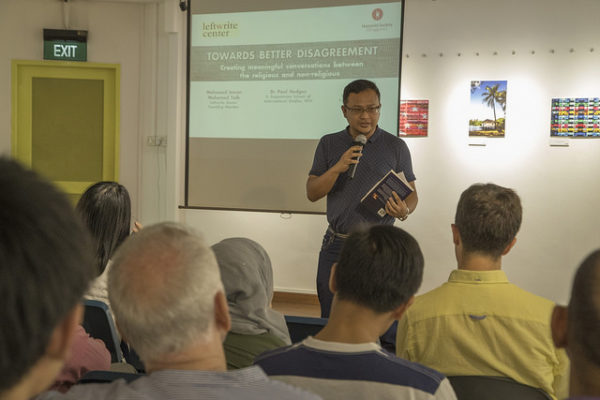Speaking at the launch of Dr Paul Hedges’ book, Towards Better Disagreement: Religion and Atheism in Dialogue, Leftwrite Center’s founder Mohamed Imran Mohamed Taib pushed for robust conversations. He said while it’s important to talk about the right of freedom of expression, it’s equally important to discuss how to have a good discussion.
Mr Imran notes that many liberal democracies have instituted protection against hate speech to shield minorities and disadvantaged groups from harm. People need to be aware of the minimal levels that are acceptable to the rest and should these lines be crossed, people need to be cognizant of the effects on society, he said.
Mr Imran then discussed sociological perspectives on the development of religion since the mid-20th century. The “secularisation thesis” argued that the role of religion would diminish or be relegated to the private sphere as society progresses. At the same time, theologians discussed the transformation of religions along the secularization process (Harvey Cox’s “The Secular City”) – and secular values. They also discussed how the marriage between civil values and public participation will transform religion along those lines.
However from the 1970s, Mr Imran said there was a fortification of religion along a certain worldview which came to be known as fundamentalism. This worldview became enmeshed in global politics and emerged as a significant force in lobbying powers. It also entered the public sphere and began encroaching as pressure movements on many governments. As fundamentalist religion became more prominent, the earlier excitement about the engagement between religion and secularism took a backseat.
In the 1970s, World Council of Churches held dialogues with other faiths and ideologies. The Catholic church was also at the forefront of interfaith dialogue and dialogue with people of no belief. However, the Muslim world was still coming out of decolonization and still slow in accepting the framework of interfaith. The question of compatibility between secularism and religious reason was at the crux of the issue. Throughout the 1980s and 1990s, there was a chasm between those who think that secular thinking was fundamentally at odds with religious ideas.
As fundamentalist religion became more assertive, there was a drawback from secularists who felt that the public sphere needed to be protected in terms of its secularity and therefore religion needed to be pushed back to the private sphere. The rise of new atheism is part of parcel of this wider context of contestations as a result of global significant shift in many societies, said Mr Imran. In the Singaporean context, something similar also happened. There was a focus on interfaith dialogue because Singapore is quite a religious society.
Mr Imran noted the emergence of a significant category of people who profess to have no religion (agnostic, atheist, free-thinkers, or those who don’t subscribe to established institutional religion) – 18.5% – third largest group behind Christianity and Buddhism. Despite their numbers, there is a blind spot in the process of policymaking, especially when it comes to moral issues, as people who have no religion are not consulted. Mr Imran said there is a need to engage with this category of people. There is a growing interest by institutions in trying to understand these people, and the Humanist Society has been upfront in trying to represent its members.
Mr Imran said Dr Hedges’ book is very useful and can be a conversation starter with “the Other.” During the first dialogue session between religious people and atheists, Mr Imran noted a lot of pent up frustrations on different issues that have not been discussed for too long. The lack of space to talk and have their views articulated and clarified could push people towards extremism, Mr Imran warned.
There is also a need to acknowledge the diversities within religious and non-religious groups. Religion cannot be generalized, given the different religious groups, communities, denominations, orientations, as well as positions on various issues. There are so much nuances that need to be highlighted, said Mr Imran. Having more discussions will help moderate views to the centre. Dialogue helps to remove overgeneralized or stereotypical views, such as the view that atheists are immoral and are thus anarchic. Imran recalled having atheist friends who are in fact more moral than the religious ones.
With more dialogue, people will start seeing “the Other” as human beings first, instead of through the construct of their belief, said Mr Imran. People also need the humility to learn from each other in order for the conversation to move forward. If one enters a conversation thinking that there’s nothing to learn from the Other, there is no way the conversation can move forward.
Lastly, Mr Imran called for ‘agnostic certainty’– the sense that there are many things that we do not know. Mr Imran talked about some ‘fundamentalist’ atheists and religious people who are certain with their beliefs that there’s no way they can entertain any doubt and refuse to re-examine their beliefs in light of new information and circumstances.
Mr Imran said the pursuit of truth is always a process and dialogues can help in this pursuit, without putting ourselves in the “dangerous” position of absolute truth. While we are certain of certain opinions, there must be some room for doubt in order for us to grow, he said.





